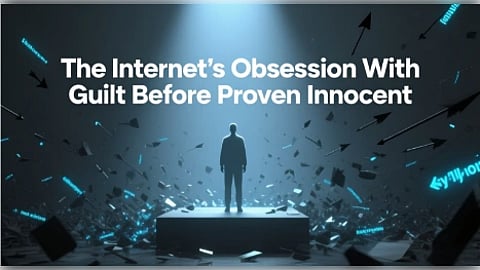
- Home
- न्यूजग्राम
- India
- World
- Politics
- Entertainment
- Culture
- Lifestyle
- Economy
- Sports
- Sp. Coverage
- Misc.
- NewsGram Exclusive
- Jobs / Internships

By Adam
It usually starts small.
A short clip, a screenshot, or a single tweet during someone’s commute. By lunch, a stranger’s name is trending. By dinner, their employer “takes allegations seriously.”
No judge. No cross-examination. Just a verdict delivered by the feed.
The instinct to decide before we know the truth is now part of online culture. Platforms reward what grabs attention fastest. We reward what confirms what we already believe. Together, we turn rumors into reputation.
Public shaming isn’t new. Salem had its trials. Newspapers in the 1800s had their headlines. Every new medium—from radio to television—magnified emotion and blurred the line between justice and spectacle.
When the internet arrived, that process accelerated. What once took days now takes seconds. Anyone with a phone can broadcast to millions.
An MIT study in 2018 found that false information spreads six times faster than the truth. The reason is simple: emotion travels faster than evidence. It’s the same formula that sold newspapers in the 1890s—only now, algorithms do the selling.
Open any app during a viral case, and the cycle is clear. Short clips and bold captions drown out nuance. Reaction videos pile up, and what began as a story turns into a verdict.
Anonymity makes it worse. People say things online they’d never say in person. Forums reward outrage, and mob energy builds quickly. The result is a system where confidence spreads faster than truth.
Justine Sacco learned that lesson the hard way. One careless tweet before boarding a flight. Eleven hours later, she landed to find her career destroyed. Online, sentencing comes first. Evidence arrives later—if anyone still cares.
Our minds are built for shortcuts, not fairness. Psychologists call them cognitive biases, and social media magnifies every one:
Confirmation bias: We trust what supports what we alredy think
.
Availability bias: We judge based on what’s most visible—usually viral clips.
Groupthink: We stay silent when everyone else agrees.
Hindsight bias: We convince ourselves we “knew it all along.”
These patterns make echo chambers feel like the truth. It’s easier to like than to question, easier to join than to pause.
Small habits make a difference.
Read multiple outlets, especially ones that challenge your views. Wait a day before sharing viral claims. Ask what evidence could change your mind. Use resources like Ground News or FactCheck.org to test what you read.
The goal isn’t perfection—it’s hesitation before harm.
Outrage spreads because it feels good. When Roseanne Barr was fired in 2018, researchers counted nearly two million celebratory tweets. That brief sense of moral victory—what psychologists call schadenfreude—is part of what keeps outrage alive.
Platforms profit from that feeling. The more we react, the longer we stay, and the more ads they sell. Even activism can slip into the same loop, where outrage becomes performance rather than progress.
A study in the Journal of Communication found that waiting just 24 hours before posting reduces impulsive sharing by 60 percent. Reflection, not reaction, is real resistance.
The fallout isn’t digital—it’s human.
False accusations online have been linked to a 25 percent rise in suicide rates among young adults (CDC). One in four people reports worsened mental health from online harassment (WHO).
Defamation-related disputes now cost the U.S. more than $10 billion a year. Behind those numbers are teachers fired over memes, students denied opportunities, and families facing stigma that lingers for years.
Even when the truth emerges, Google rarely forgives. At NetReputation, we see this every day—clients whose search results still reflect lies long after the facts are corrected. Repairing that damage takes time, strategy, and consistent positive visibility.
Justice moves more slowly than the internet. Under New York Times Co. v. Sullivan (1964), public figures can only win defamation cases by proving “actual malice”—a nearly impossible standard in a world of anonymous users.
Section 230 of the Communications Decency Act shields platforms from liability for what users post. Even algorithmic amplification is protected. Meanwhile, the European Union imposes billion-dollar privacy fines, while the U.S. lags.
The result is a digital Wild West where reputation is public property and accountability is rare.
There’s no single fix, but progress starts with five steps:
Smarter Platforms: Reward accuracy over engagement. Twitter’s Community Notes reduced viral falsehoods by 25 percent.
Updated Laws: Reform Section 230 and enforce transparency, as the EU’s Digital Services Act does.
Education and Literacy: Finland’s media literacy programs improved misinformation detection by 40 percent—proof that critical thinking can be taught.
Responsible Media: Separate verified reporting from commentary. Accuracy still earns long-term trust.
Personal Accountability: Think before posting. Every careful share helps rebuild the culture of fairness.
The internet turned public opinion into a weapon—fast, loud, and unforgiving. Every viral accusation feeds a system that confuses visibility with truth.
Justice depends on patience and evidence. The web rewards speed and emotion. Until laws, platforms, and people move toward balance, “innocent until proven guilty” will remain a principle remembered, not practiced.
For those already caught in that cycle, NetReputation helps rebuild trust and visibility by replacing misinformation with verified, positive content—proving that while the internet may rush to judgment, recovery is still possible.
(NG-FA)
Suggested Reading:
